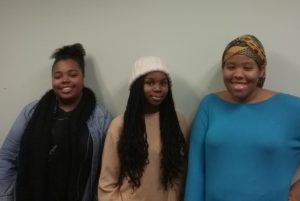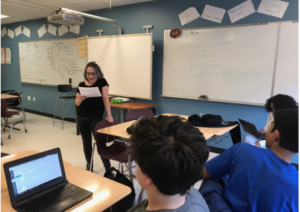
Lauryn Lewis
Staff Writer
What exactly is peer mediation?
If you don’t know, that’s ok. Before I heard an announcement about this program in the advisory memo, I had no idea what it was either. I’m not sure why I signed up for the training, but I’m glad I did.
Peer mediation is a way to help students solve disagreements by forging an agreement between two or more parties. This system allows students who have issues to solve them without getting adults involved and clearing up the problem before it blows up.
I have completed two trainings so far and at each training we took steps to become better peer mediators. At the first meeting, besides socializing among each other, we all brainstormed issues that might arise among students in the school. We also went over the true meaning of peer mediation and what exactly we would do in a meeting. For the second meeting, the peer mediators were given the chance to have a mock peer mediation. This really helped us to understand what we needed to do and what we might deal with in the meetings.
So how does the system work?
The process was set up my School Counselor Zoe Siswick’s intern, Ms. Tess. She designed a google form for students to schedule their peer mediations. All the student would have to do is, sign up via google form saying that you have an issue that you would like resolve with someone in the school. Both parties would have to agree to sitting down with peer mediators and going over the issue. Each disputant will have time to explain their point of view of the situation. After each person speaks on what they feel the problem is, they will be allowed to come together and list potential ways to fix the problem.
All of the peer mediators understand why students might have mixed emotions about coming to the group. Some might say that they do not feel the need for peer mediation when they can handle the situation themselves while others might not want anyone in else knowing about the difficult situation they are in.
However, peer mediation will become a big deal here at SLA because the peer mediators are students. The students here at SLA will be more open to other non-judgemental students hearing their problems rather than the teachers. Peer mediators include: Ella Marton, Chloe Simmons, Jade Gilliam, Lauryn Lewis, Aniya Linder, Tyah Ward, and Jordan Grayes. The students will also be able to relate to the peer mediators being that we are all in the same age range and the mediators all have experience at the school.
And trust me, we have all had our fair share of issues and disagreements with other students that have led us to wanting to help solve the issues of others.


